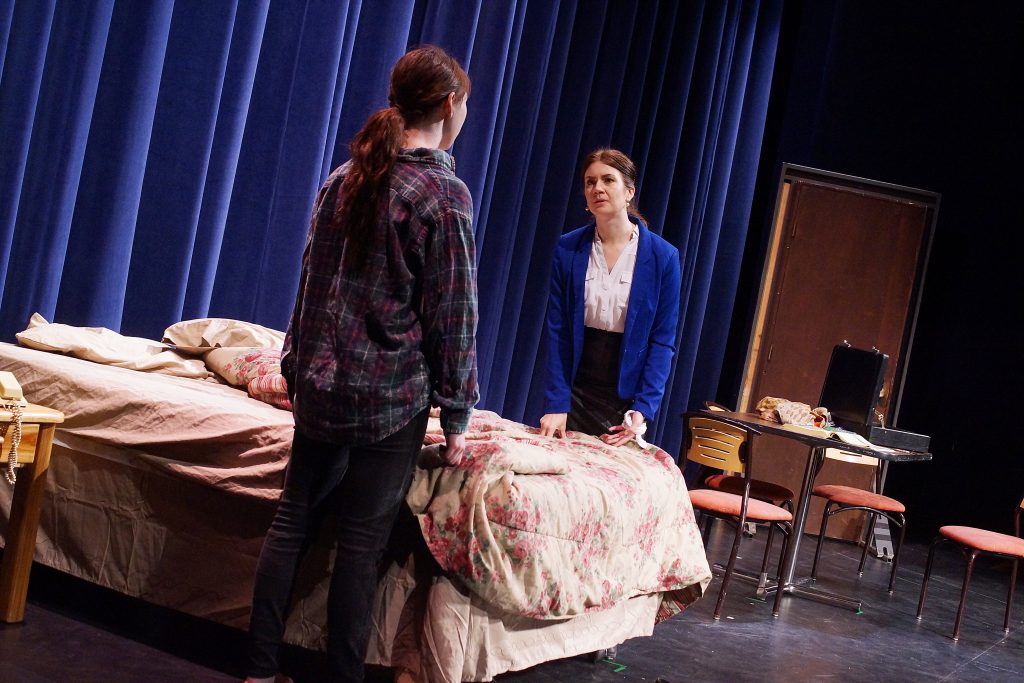
On the surface, this year’s Binghamton University Mainstage productions promise diversity in the genre of shows being staged. The semester kicks off with a contemporary play, “The Motherf**cker with the Hat,” followed by the musical golden-age piece “Bells are Ringing,” and comes to a close with an original jazz version of “The Nutcracker.”
Within the department, however, measures are being taken to ensure that the casting of the shows is diverse as well, with a new audition process that the season’s directors hope will bring in a group of actors who reflect BU’s student body.
Though this is not the first time in recent history that the department has expressed its consideration for onstage diversity — last April, a panel at the theatre department alumni conference centered on the subject — this particular movement was born when Carol Hanscom, an adjunct lecturer of theatre, pitched “The Motherf**cker with the Hat” to the department when it chose plays to produce in the next season. The play, which requires actors of color in principal roles, started the conversation about ensuring casting to be more racially diverse.
“We’ve always cast our shows without regard to whether a character is supposed to be white,” said Tommy Iafrate, director of “Bells are Ringing” and an assistant professor of theatre. “But by doing a play like ‘The Motherf**cker with the Hat,’ it’s kind of a different case, because these are characters whose ethnicity and whose racial identity is important to them, and that’s a bigger part of the storytelling.”
With three Latino leads, “The Motherf**ker with the Hat” presents a cast of characters diverse enough to be a realistic reflection of its setting, New York City. To create these lifelike worlds onstage, the department is working to create the same diversity in “Bells are Ringing,” a musical which is also set in New York City but first premiered in 1956 with an all-white cast. To Iafrate and Hanscom, to produce the same show 60 years later in that fashion would be unacceptable.
“There are lots of responsibilities that we have as theatre artists in the 21st century when it comes to the worlds we create onstage,” Iafrate said. “One has to do with plays like ‘The Motherf**cker with the Hat,’ when you’re honoring the work of a playwright and you’re adhering to the characters who are on the page. But that doesn’t let me off the hook when I’m directing a play that first premiered in 1956 … the play takes place in New York, and the New York that I know is a rich, diverse place with all sorts of different people. For me to create a world onstage and call it New York and for it to only have white people in it would lack integrity.”
In order to attract a more diverse group of actors to auditions, the department will have two different processes: the first will allow a traditional professional audition, in which the actor prepares a monologue and about a minute of music to sing, for theatre majors and anyone else interested.
For people who have less of a background in theatre, their audition process will include signing up for a 1 1/2 hour-long slot in a group with nine other people, where they’ll be taught a musical number from “Bells are Ringing” and given excerpts from “The Motherf**cker with the Hat” to rehearse and perform with each other. The directors said they hope this process will appeal to a greater number of students at BU, which would better allow them to create a diverse cast.
Though the plays chosen for the spring 2017 semester do not necessarily take place in racially diverse settings — the first play next semester, Sam Shepard’s “A Lie of the Mind,” is set in Montana — the department will likely continue this format of auditions to reach out to as many BU students as possible and have a cast that reflects the University’s diverse student population.
“[There are students] who have done theatre in their past, but they’re afraid to step out and do it in a larger setting,” Hanscom said. “Auditioning is scary. So we’re trying to break down those barriers so that people can come and show us how delightful they are, and what a sparkling presence they have through scene work, if that’s what they choose to do.”
Auditions for the fall 2016 Mainstage season will take place on Sunday, Aug. 28 and Monday, Aug. 29.


